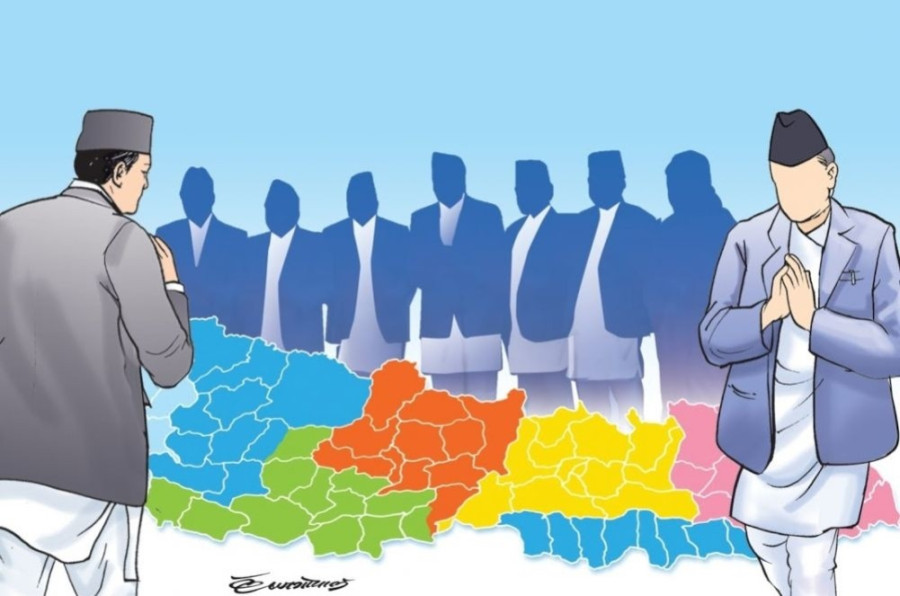Columns
Federalism insights from local leaders
For many, decentralisation and fiscal empowerment are central to the federalism debate.
Khim Lal Devkota
During recent provincial programmes organised by the Federalism and Localisation Centre, I engaged in discussions with key local government officials, including Nagesh Koirala, Mayor of Biratnagar Metropolitan City; Dhana Raj Acharya, Mayor of Pokhara Metropolitan City; Manoj Kumar Sah and Meena Kumari Lama Mayors of Janakpur and Hetauda Sub-Metropolitan Cities; and Mohan Maya Dhakal, Mayor of Birendranagar Municipality. They provided valuable insights into the state of local governance under federalism. This article captures their perspectives, highlighting the successes and obstacles encountered as local governments adapt to Nepal’s evolving federal structure.
Pokhara’s mayor Acharya expressed frustration with the perception of local government as mere administrative extensions rather than fully empowered entities. He lamented that local governments have authority over basic services like education and healthcare, yet they face constant resistance from employees unwilling to recognise their jurisdiction. Additionally, the persistence of District Coordination Committees and federal control over resources, such as drinking water and local infrastructure, continues to blur authority and accountability. For Pokhara, a tourism capital, he envisioned support from both federal and provincial levels to realise its full potential. He also noted that without proper intergovernmental coordination, such ambitions remain challenging.
In a similar vein, Chairperson Krishna Bahadur Thapaliya of Benighat Rorang Rural Municipality, Dhading, voiced concerns over federalism’s sustainability. Reflecting on the sacrifices of the past, Thapaliya remarked, “We fought for this structure, but educated elites seem to distort it through convoluted interpretations.” He urged leaders to stay grounded in federalism’s original principles to prevent misinterpretations that could weaken the system. Echoing this sentiment, Dan Bahadur Gurung from the Ichchhakamana Rural Municipality of Chitwan underscored the interconnectedness of all three levels of government, stating, “Without empowering local governments, neither the provincial nor federal levels can thrive.”
Dambar Bahadur BK, Chairperson of Khajura Rural Municipality in Banke, underscored the need for stable executive provincial governments and called for provincial control over administrative matters like staffing, which currently suffers due to unestablished provincial laws.
For many local leaders, decentralisation and fiscal empowerment are central to the federalism debate. Dilip Kumar Rai, Mayor of Pathari Shanishchare Municipality in Morang, raised concerns about the lack of resources and autonomy despite constitutionally granted powers. He highlighted that as per the constitution, land registration should be handled locally, but this authority remains centralised. Furthermore, healthcare expansion has been hindered by budgetary constraints and workforce shortages. “In my municipality with 72,000 residents, we are restricted to a 15-bed hospital, whereas smaller local levels in other regions enjoy greater healthcare facilities,” Rai noted. He stressed that budgeting should reflect population and need, not rigid allocations set without local input.
For Nagesh Koirala, Mayor of Biratnagar, the question of provincial relevance is as critical as environmental conservation in Nepal’s Chure region. In response to questions about the viability of federalism, Koirala argued that provinces are integral to governance, likening them to essential ecological systems. “Provinces must remain as pillars of local governance,” he asserted, adding that development programmes should be seen as long-term investments rather than temporary projects. He highlighted that federal and provincial policies must better align with local priorities, suggesting that overemphasising centralised decision-making stifles local autonomy.
Nim Bahadur KC, Chairperson of Darma Rural Municipality, Salyan, highlighted fiscal transfers as a significant change but argued that federalism’s survival requires more support for local governance. He expressed concerns over the federal government’s reluctance to transfer administrative authority and reduce fiscal equalisation grants, which weakens fiscal stability at the local level.
In Bheri Ganga Municipality, Surkhet, Mayor Yagya Prasad Dhakal pointed out that federalism has no alternative if Nepal aims to achieve good governance and prosperity. He proposed that the federal government focus on national and international affairs, provinces on infrastructure and development and local governments on service delivery. Dhakal argued that mayors need adequate political connections to operate effectively and noted the imbalance in local powers, where municipalities have local police, but provinces lack provincial police forces.
Several leaders raised concerns over budgeting and revenue collection constraints. Meena Kumari Lama, Mayor of Hetauda sub-metropolitan city shared the challenges of expanding the local tax base and maintaining good governance amid clashes with contractors and illegal activities. She contended that the lack of a proper fiscal federalism mechanism has hindered the delivery of services and development goals.
Sher Bahadur Shahi, Chairperson of Shivalaya Rural Municipality in Jajarkot, voiced concern over the practical implementation of federalism, particularly in the underdeveloped Karnali Province. Shahi criticised the inadequate budget allocation for provincial projects, noting that funds provided are insufficient to address local infrastructure needs, such as purchasing essential supplies like pipelines. He questioned the federal government’s focus, suggesting it seems out of touch with provincial realities and needs.
Moreover, many mayors emphasised the importance of federal and provincial collaboration to address local needs and strengthen the country’s federal structure. Vaikuntha Neupane, Mayor of Byas Municipality Tanahun, highlighted the inefficiencies resulting from centralised processes, remarking that local governments still lack essential resources, such as legal officers, for effective administration. This administrative shortfall, he argued, has constrained Nepal’s ability to implement federalism effectively. According to Neupane, the federal government must prioritise local capacity-building to achieve meaningful progress.
Rajan Paudel, Mayor of Jitpur Simara Submetropolitan City, suggested a fundamental rethink of federalism implementation. He called on federal authorities to ensure local governments can exercise constitutionally granted rights. “We are the closest to the people,” Paudel said. “Our role is to assess service delivery and local development outcomes that directly impact lives.”
This sentiment was echoed by Manoj Kumar Sah, Mayor of Janakpurdham Sub-Metropolitan City, who stressed that questioning federalism’s validity undermines Nepal’s progress. Sah highlighted the need to enforce rights granted to local governments, such as employee management, local law enforcement and public trust in the federal system.
For Jawaharlal Yadav, Chairperson of the National Association of Rural Municipalities in Madhesh Provincial Committee, the struggle for federalism and local empowerment goes hand in hand. Yadav pointed out that many government services, from agriculture to tourism, remain tied to the federal level, leading to inefficiencies and limited local impact. “The federal government has retained authority over essential services like agriculture and education that local governments should manage,” Yadav stated.
The journey of federalism in Nepal stands at a crossroads, demanding the active engagement of all levels of government, political leaders, policymakers, administrators and citizens. Local government representatives have voiced a clear vision for empowered governance that genuinely reflects the needs of their communities. As Nepal continues this transformative process, federal, provincial and local governments must align to foster accountability, unity and a shared commitment to realising the full potential of federalism. Collective action and sustained support can help Nepal build a federal system that meets the aspirations of its people and enhances the nation’s path toward inclusive development and prosperity.




 22.65°C Kathmandu
22.65°C Kathmandu














